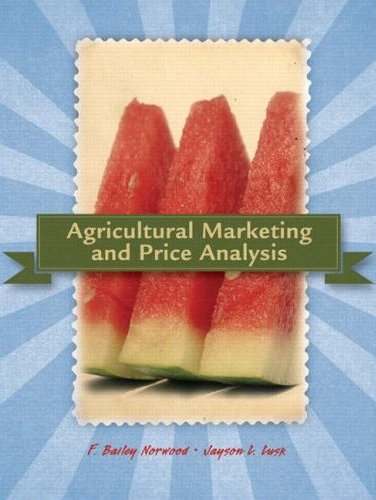Reviews of Textbook
Journal of Agribusiness book review is available in
this pdf file.
Corrections To Textbook (and please send me more if you find more!)
Despite our best attempt to produce a perfect textbook free of
errors, as with most textbooks in their first edition, there are some errors.
Below are the errors that have been found thus far and links where users may
download corrected verions of the text and figures. If you find any errors that
are not listed below, please email them to Bailey Norwood at
bailey.norwood@okstate.edu.
Chapter 1
Page 22 should say, this is a parity price, a price in one
time period that provides the same purchasing power as the price in another time
period.
Chapter 3
In the section Study Questions on page 94, question 4, beef, pork,
poultry, and fish should be substitutes, yet the cross-price elasticities in the
question are negative, when they should be positive. As the price of beef rises,
that should cause the quantity demanded of pork to rise, which would only happen
with a positive cross-price elasticity. These are real, estimated elasticities,
as given by the citation in the question, but probably just not estimated well
for a variety of reasons. So I would just tell students to change the negative
to a positive sign. On page 94 question 7, it should say "cross-price elasticity
of beef demand with respect to pork prices", not "cross-price
elasticity of beef supply with respec with respect to pork".
Chapter 4
On page 103, the heading that says Producer and Consumer Behavior in Monoply should
say Producer and Consumer Behavior in Monopsony
Chapter 7
On page 209, in Figure 7.14, the predicted price in October should be $0.80, not $0.08.
Chapter 8
The section "The Mathematics of International Market Equilibrium,"
found on pages 242-245, contains many innaccuracies. The method for calculating
the equilibrium is incorrect. The correct version of this section can be
downloaded here. For Word Format, click
here.
The correct version of Figure 8.17 can be downloaded
here. For Power Point Format, click here.
Chapter 9
Page 256, second paragraph..."This may reflect a higher
anticipated demand in April..."
Page 267, third paragraph..."A hedge is an instrument that
loses you money when prices are favorable and makes
you money when prices are unfavorable."
Page 267, third paragraph..."She hedges by
selling a corn futures contract..."
Chapter 13
We are more than a bit embarrashed about this Chapter, as we
described the second stage of production completely wrong.
This file contains
the corrected verbage, and
this file has the corrected figures.
Questions Bailey has used in class can be found below
From Agricultural Marketing and Price Analysis - 2009
Exam covering parts of Chapters 1-3
Questions covering Chapters 1 & 9
Questions covering Chapters 2 & 3
Exam covering Chapters 9 (not complete)
Questions covering Chapters 10
Questions on Chapter 5, 10, 11, 1
Questions on Chapter 5, 10, 11, 1
Homework
Homework
Homework
Homework
From From Introduction to Agricultural Economics - 2010
Exam covering parts of Chapters 1-3
Exam covering parts of Chapters 1-3
Exam covering parts of Chapters 1,4,8,10
